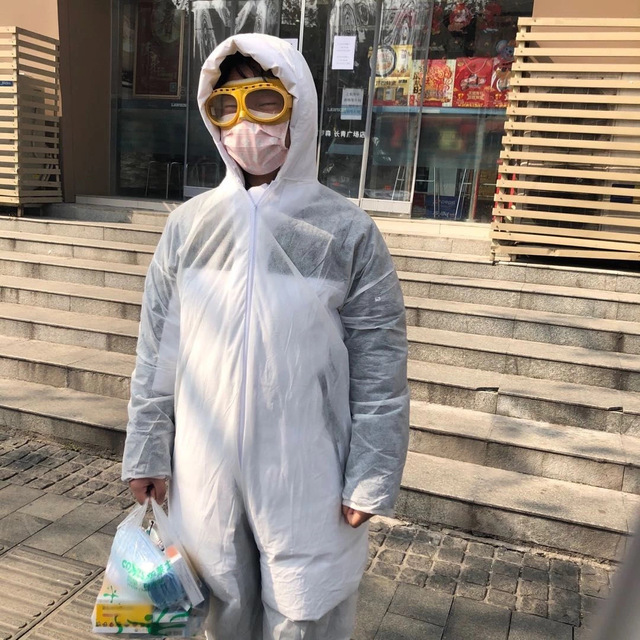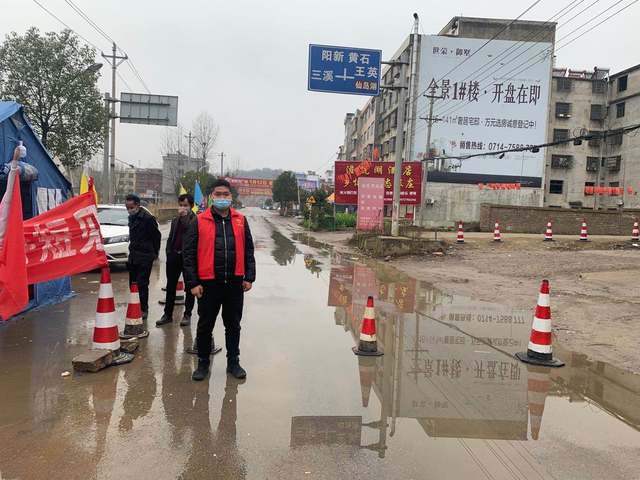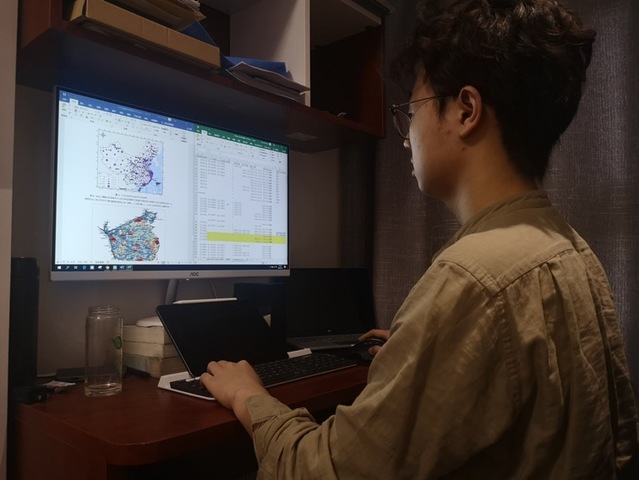China Youth Daily Client News (Liu Yuxi, a trainee reporter of Zhongqing Daily and Zhongqing.com) At night, 19-year-old Wuhan Ya Huang Xinyuan is prone to think about the past and the future, whether it is falling into the emotional "whirlpool" of adolescence or the COVID-19 epidemic that plagues this raid.
He regretted that he didn’t study medicine, otherwise he could volunteer in the nearest place to the virus. On the one hand, he was "rejected" by the age limit of 25 years old announced by the hospital, and on the other hand, his parents thought that "the child is crazy" and he didn’t want to sit still.
This is the first major public event that they have really faced since they were born after 00, because they have little memory of SARS 17 years ago. This time, in their own different ways, they became the witnesses of the "epidemic" of the national war.
Be in an epidemic area

Wuhan Ya Huang Xinyuan was "armed to the teeth" to deliver medicine. Photo courtesy of Huang Xinyuan
After taking a step back with his parents, he reached an agreement that "as long as he doesn’t go to the hospital to do anything". On January 25, Huang Xinyuan bought a big bag of masks and distributed them on the street for free with Lao Wu.
Huang Xinyuan is a freshman in Hubei Second Normal University, and Lao Wu is an art test teacher in his high school. When he learned that he could still buy masks and medicines, the two hit it off. After delivering the masks, they began to deliver medicines. In just one night, they received more than 500 messages for help on Weibo. No planning, no itinerary, only two people. A "running errands" volunteer team was formed in this way.
Huang Xinyuan lives in Labor Street, and there are five or six pharmacies near his home, which has become his regular destination for the next 20 days. But sometimes, these five or six pharmacies don’t work. He has to ride back and forth for nearly ten kilometers to buy medicine at the cheaper and more complete pharmacy over at Sanyanqiao.
Moxifloxacin, oseltamivir and Lianhua Qingwen are the drugs he buys most often. Together with other drugs, he buys 70 or 80 boxes almost every day, all of which are hung on the handlebars of bicycles. When riding, he will get in the way. His legs can only be in a figure-eight posture, which is "weird and funny". When he didn’t know the way, he held the handlebar in one hand and the mobile phone in the other. He didn’t look at the map for fear that he would go the wrong way and delay the time.
Wuhan’s road network is irregularly divided by rivers and lakes. Even for locals, Huang Xinyuan is a "road idiot". However, only three or five days later, he became familiar with Jiang ‘an District, Jianghan District and Qiaokou District, which he often visited.
Every day, Huang Xinyuan spends about 20 yuan on bike-sharing fare. Running much more, he can feel which street is more severe, and he can also arrange which route to take more efficiently. On the busiest day, he gave medicine to 10 families, rode for nearly 50 kilometers, and went as far as Dongxihu, which took less than half an hour to drive. It was past 11 o’clock when he got home that night, his parents fell asleep, and his dinner was nowhere to be found. Huang Xinyuan was too tired to feel anything, but he was so hungry that he remembered it clearly. He only ate a sandwich that day.
It’s windy in Wuhan in winter, because it’s not convenient to use mobile phone to contact people. Huang Xinyuan doesn’t wear gloves, and it’s useless to put hand cream on her bare hands all day. All the equipment he can use is a mask and half a bottle of residual alcohol he used to disinfect his ear holes. It was not until the last few days before school started that he used protective clothing and goggles donated by good people.
He is not afraid of death. "After all, he is only 19 years old and still wants to live." But he went to the suspected and diagnosed patients. "If you are really infected, be prepared." He takes Lianhua Qingwen capsule every day and asks his classmates and mothers who work in the hospital for protective measures.
Face to face is less than two meters away. "It’s no use being afraid. You can’t change anything. It’s better to do something useful than hide." Huang Xinyuan was afraid for the first time. It was at 8 o’clock in the evening that she went to the designated isolation hotel to deliver medicine to patients. The street was empty, almost pulled to the isolation belt of the road, and the heavily armed staff and strict posture made the 19-year-old boy who had not been so afraid suddenly feel afraid. "I can still hear my heart beating when I walk out of the hotel."
Huang Xinyuan gave the patient medicine three times in total, but never met him once. However, on WeChat, the two chatted for a while. From the helplessness of "no doctor, I don’t even know what medicine to take" to the confidence that "I have been discharged from the hospital without waiting for the newly tested medicine", Huang Xinyuan often encouraged her and witnessed her transformation.
Huang Xinyuan, who was questioned on the Internet and always evaluated as precocious, also has a temper like a child. But he later realized, "I’m not from Wuhan, I’m not in Wuhan, I can’t understand our feelings, so there’s no need to care." On his WeChat, more than 100 new friends are his "proof of willingness". "Getting an approval is more meaningful than 100 questions." He used Mr. Lu Xun’s words to spur himself, "May all the young people in China get rid of air conditioning, just go up and don’t have to listen to the words of self-abandonment."
Yixiandinggang
Facing the rapid spread of Covid-19, Pan Zi Kun, a freshman at Jiangnan University, was really scared. The sudden and disorganized outbreak interrupted all her original plans for this winter vacation. The circle of friends was screened by the epidemic map, full of shocking red and orange. As a military doctor, her parents have gone to the "battlefield", but she is too anxious to find a sense of existence.
At that time, Pan Zi’s parents’ hospital had admitted confirmed patients, but there were only 15 N95 masks in the whole hospital. The mother who is in charge of raising materials is squatting day and night, making phone calls and running to the factory, and the family can’t even get together for dinner. Sorrow is not only written on mother’s face, but also painful in Pan Zi’s heart. Being out of Wuhan, she asked herself what she could do.
Knowing that the hospital was short of people, Pan Zi offered to be a volunteer. At first, she hesitated, feeling that she could do nothing, and might even "help". Her parents were surprised, and one sentence reassured her: "Your generation is the reserve force of society, and one day it will be your turn to rush to the front line. If you don’t exercise now, what should I do when I need you in the future? "
In the afternoon, Pan Zi went to the hospital with her parents. Her job was to take temperature at the entrance of motor vehicles. All the hair is wrapped in the hat, and the goggles are pressed on the mask. "There is no breathable space." In the cold air, she could feel that the water vapor she exhaled was warm and humid, and the fog condensed on the lens, which was a blur. She only knew that there was a car coming, and there were several people sitting in it, so she couldn’t see clearly.
Pan Zi has never had such an experience, and the sense of oppression extends from home to work. Everyone is careful to say as little as possible. The most frequently asked question is "What’s the temperature? Is it high? " Under the epidemic situation, the anxiety of fear of death and the vigilance of not letting go of a hair made her even more breathless.
On the first day, she met a baby with a high fever of 39 degrees. Rolling down the window, the child’s parents just took out their masks. The mother’s hair on the co-pilot was not combed at first sight, and the father in the driver’s seat was also dressed in disorder, his clothes buttons were not fastened, his neckline was wide open, and his brow was full of impatience. He wouldn’t listen to Pan Zi’s advice to wear a mask, but kept "screaming" that the child was ill.
"I thought of my dad at once." Pan Zi didn’t blame the father at all, but especially understood his "impatience". She seems to see her father, who is usually gentle, optimistic and indifferent, and only cares about her daughter. "If it is not necessary, who will come to the hospital in this special period?" After that day, Pan Zi became more aware of the painstaking efforts of parents all over the world.
That day, she stood for more than four hours to her parents’ surprise, without drinking water, playing mobile phone or going to the bathroom. She was no longer the "delicate little princess" in her parents’ hearts. In fact, she has questioned herself more than once. Can she really support the future of the country?
Now that she has confidence, she is not afraid at all. Among her peers, some people "retrograde" on foot to protect people in epidemic areas, some people put on protective clothing to fight the virus, and others, like themselves, volunteered to be volunteers and glow in different corners.
Guarding a small family

Liu Pengcheng is on duty. Photo courtesy of Liu Pengcheng
"Son, you can’t fight because of danger ‘ Retreat ’ Yes. In line with the conviction that I will do whatever it takes to serve my country even at the cost of my own life, regardless of fortune or misfortune to myself. I hope you can know and do it. When the country needs you, when the profession needs you, you can bravely stand up and say I can. " This is a sentence given to her daughter by Wang Hui, a doctor from Yan ‘an Hospital in Kunming who supports Wuhan’s response to COVID-19.
Li Qian was moved by this sentence. He is a freshman majoring in law at Nanjing Audit University. He participated in the voluntary work of filling in and checking Yuhang Green Code in Hangzhou.
Yuhang District has the largest number of confirmed cases in Hangzhou. Li Qian’s mother received a notice to work from 4 pm to 12 am. In special times, it is impossible to say that you are not worried about safety. But what Li Qian is most worried about is that her mother has night blindness. In order to take care of his mother and protect his family, he decided to "play" himself.
Yuhang District adopts the mode of "code scanning+body temperature measurement+reporting information" and classifies citizens’ identity information simply and quickly according to four colors of "red, green, yellow and gray". There are two or three related personnel in charge of inspection at each bayonet, one for temperature measurement and one for code scanning. Li Qian is the volunteer in charge of bayonet inspection.
Like Li Qian, Liu Pengcheng of Wuhan Communications Vocational College is also a volunteer of bayonet. But the difference is that he is in a high-risk area of the epidemic — — Sanxi town, Yangxin County, Huangshi City, Hubei Province. When the village committee first recruited volunteers for epidemic prevention and control, he stood up. The red vest of the "young volunteer" has not been taken off until now.
On the first day of his post, Liu Pengcheng met a big truck with E-A license plate for transporting liquefied gas tanks. He looked like a tough guy and instinctively panicked. From 8: 00 to 9: 00, he stuck to the village card point for more than 10 hours every day, changed his post and didn’t let himself be idle. He also took the initiative to publicize at home and went door-to-door to investigate and deliver materials.
This 20-year-old boy who "waits for you at the intersection in the wind and rain" is sometimes "cold".
"Just go out and buy food 100 meters ahead." "No, unified procurement in the village." Communication and persuasion is the biggest difficulty in Liu Pengcheng’s work. In the villages near Shouka, most villagers make a living by growing and selling vegetables. After the card is set up, the villagers can’t get out and have to "punch the card" forcibly.
"I am a college student in Wuhan, and I really want to go to Wuhan, but since we can only stay here, let’s make some contributions to our hometown." After more than an hour of stalemate, Liu Pengcheng finally "persuaded" the villagers.
But more often, this tough guy has a soft heart.
It’s especially cold on the banks of Sanxi River, which is raining. A 60-year-old man rode an electric car in the rain for more than half an hour and wanted to go to the hospital in the town to treat the wound. The foot cut by the firewood knife was only wrapped in a medical bandage several times, tied in a knot at random, and splashed with rain and mud all the way. He comes from the village farthest from the town.
Seeing that the hospital was just ahead, the old man wanted to go home because there was no relevant certificate. Liu Pengcheng couldn’t bear to break the rules and "let" the old man go to the hospital. "If you don’t do this, you can’t get through it."
For a month, he witnessed two groups of people going in and out from the isolation hotel opposite. Just a few days ago, the last batch of villagers ended their isolation and returned home safely. And Liu Pengcheng continues to keep at the intersection, waiting for the day when it is truly "cleared".
Online support

Chen Chunyu of Tsinghua University presented the epidemic information in a visual way. Photo courtesy of Chen Chunyu
On January 31, an article entitled "A map that may lie — — Re-examining the Geographical Pattern of the National Epidemic "was published in WeChat official account for only a few hours, and the reading volume exceeded 100,000.
This article comes from the project team of "nCoV Epidemic Map", a spontaneous volunteer team initiated by Chen Chunyu, a sophomore in Tsinghua University. They set up a real-time updated epidemic database, and provided it to major universities and research teams around the world in an open source way, presenting epidemic information in the form of spatio-temporal big data visualization.
"In the beginning, I was as nervous and confused as everyone else. I refreshed my mobile phone repeatedly and checked the news about COVID-19. Fear comes from the unknown. Neither the provincial epidemic map nor the scattered reports can describe the details of the epidemic in time and space. So I hope I can make an epidemic map with more details. "
Taking advantage of professional advantages, Chen Chunyu began to collect and sort out detailed data of the epidemic from January 20th. However, with the spread of the epidemic becoming more and more serious, more and more data need to be collected, and Chen Chunyu’s "explosive liver" staying up late is still limited. He immediately began to recruit and form a volunteer team. Through alumni channels, information has spread to colleges and universities all over the country and even the world, and based on this, it has attracted more attention from young volunteers.
Li Donglin of the outreach publicity group is also a post-00, and he is a sophomore in Shandong University. His original intention to join this volunteer project is simple. "Actions speak louder than words. Instead of commenting on the rhythm on social networks every day, it is better to do something useful and practical."
Team members, including Chen Chunyu and Li Donglin, don’t know each other and have different professional backgrounds. They are scattered all over the world. In the face of the epidemic, "we take the initiative to gather spontaneously and do our best to make the world warmer." Our distance is very far, and our distance is also very close. " This is what Chen Chunyu wrote on the first day.
Now, the online school has started, and Pan Zi has also become an online volunteer. Through the Young Volunteers’ Association of Jiangnan University, she helped the students of Grade Three with math and physics online. "I don’t think it’s enough. I can’t wait for them to assign me more children, so I want to help more."
This is the first time that Pan Zi has officially participated in voluntary service, but she can’t stop volunteering. She also signed up as a volunteer for the 2022 Beijing Winter Olympics. "No matter what position, just let me go and do anything."
She carefully studied the recruitment requirements of volunteers for the Winter Olympics, and wanted to learn foreign languages well and participate in more volunteer service activities. She feels that what she has done at present is far from enough. After all, this girl is only 18 years old.